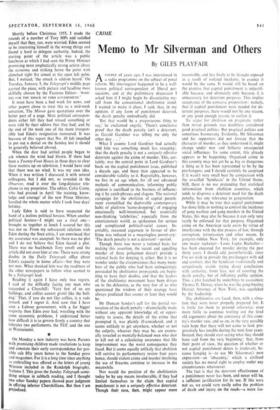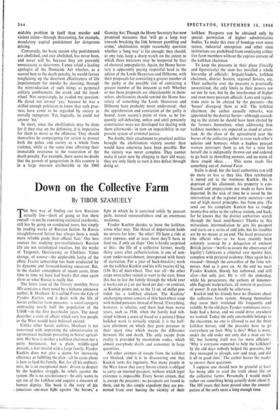Memo to Mr Silverman and Others
CRIME
By GILES PLAYFAIR
ACOUPLE of years ago, I was interviewed in a radio programme on the subject of penal reform. My interrogator happened to be a well- known political correspondent of liberal per- suasions, and at the preliminary discussion I asked him if I might begin by dissociating my- self from the conventional abolitionist stand. I wanted to make it clear, I said, that, in my opinion, if any form of punishment deterred, the death penalty undoubtedly did.
`But that would be a preposterous thing to say,' he exclaimed angrily. 'There's conclusive proof that the death penalty isn't a deterrent, as Gerald Gardiner was telling me only the other day . .
What I assume Lord Gardiner had actually told him was something much less sweeping: that the death penalty is not a uniquely effective deterrent against the crime of murder. This, cer- tainly, was the central point in Lord Gardiner's book on the capital punishment issue, published a decade ago, and there then appeared to be considerable validity to it. Regrettably, however, we live in an age when, for all our advanced methods of communication, informing public opinion is sacrificed to the business of influenc- ing it by catch-phrases and slogans. The national campaign for the abolition of capital punish- ment exemplified the deplorable contemporary habit of platform `name-dropping'; of engaging emotionally well-intentioned, but essentially non-thinking 'celebrities,' especially from the entertainment world, as spokesmen for serious and complicated political-social causes. In- evitably, reasoned argument in favour of abo- lition was reduced to a meaningless parrot-cry: `The death penalty is not a deterrent'—period.
Though there was never a rational basis for making this assertion, the recent and appalling murder of three policemen doesn't provide a rational basis for denying it, either. But it is no wonder under the circumstances that many mem- bers of the public who had been uninquiringly persuaded by abolitionist propaganda are begin- ning to have their doubts, and that the leaders of the abolitionist movement have been driven on to the defensive, as the very few of us who questioned the wisdom of their strategy have always predicted that sooner or later they would be.
Mr Duncan Sandys's call for the partial res- toration of the death penalty—dramatically made without any apparent knowledge of, or oppor- tunity to assess, the details of the crime that prompted it, was plainly ill-considered, and it seems unlikely to get anywhere, whether or not the culprits, whoever they may be, are eventu- ally revealed as mentally-balanced men who shot to kill out of a calculating awareness that life imprisonment was the worst consequence they faced. But it seems equally unlikely that abolition will survive its parliamentary review four years hence, should violent crime and murder involving the use of firearms continue to increase in the meanwhile.
Nor would the position of the abolitionists today be by any means invulnerable, if they had limited themselves to the claim that capital punishment is not a uniquely effective deterrent. Though their case, then, might appear more
reasonable, and less likely to be thought exposed as a result of isolated incidents, in essence it would be the same. It would still be based on the premise that capital punishment is unjustifi- able because, and ultimately only because, it is unnecessary for deterrent purposes. This implies acceptance of the converse proposition : namely, that if capital punishment were needed for de- terrent purposes, there would not be any reason, or any good enough reason, to outlaw it.
To argue for abolition on pragmatic rather than moral grounds was doubtless considered good practical politics. But practical politics can sometimes boomerang. Evidently, Mr Silverman and his supporters did not foresee that the character of murder, as they understood it, might change under new and hitherto unsuspected social influences. To some extent, this already appears to be happening. Organised crime in this country may not yet be as big or dangerous a thing as it has been represented to be by the pro-hangers; and I should certainly be surprised if it wasn't very small beer by comparison with the so-called 'Syndicate' in the United States. Still, there is no use pretending that statistical information from abolition countries, which tends to disprove a deterrent need for the death penalty, has any relevance to gangsterism.
While it may be true that capital punishment has done little or nothing to control the incidence of gang warfare and gang murders in the United States, this may also be because it can only very rarely be enforced for that purpose. Organised crime on the American scale exists by virtue of interference with the due process of law, through corruption, terrorisation and other means. In gangster-ridden New York, for example, only one major racketeer—Louis Lepke Buchalter— has been executed for murder during the past thirty years. I should add, parenthetically, since I've no wish to provide the pro-hangers with aid and comfort, that the Syndicate traditionally and scrupulously avoids trying direct conclusions with authority, from fear, not of courting the death penalty, but of inflaming public opinion. Thus a plot hatched by underlings to assassinate Thomas E. Dewey, when he was the gang-busting District Attorney of New York, was squelched by the leadership.
The abolitionists are faced, then, with a situa- tion they were never properly prepared for. It is futile for. them to pretend otherwise; even more futile to continue trotting out the tired old arguments about the constancy of this coun- try's murder rate, and so on, in the very possibly vain hope that these will not come to look pro- gressively less tenable during the next four years. Instead, they should start saying what they should have said from the very 'beginning : that, from their point of view, the question of whether or not capital punishment deters is irrelevant, be- cause hanging is—to use Mr Silverman's own expression—an `obscenity,' which a civilised society has no moral right to employ under any circumstances whatsoever.
The fact is that the deterrent effectiveness of a punishment never has been, and never will be, a sufficient justification for its use. If this were not so, we could very easily solve the problem of death and injury on the roads—a more for- midable problem in itself than murder and violent crime—through threatening, for example, mandatory capital punishment for dangerous driving.
Conversely, the basic reason why punishments are abolished, and stay abolished, has never been, and never will be, because they are provenly unnecessary as deterrents. I once asked a leading apologist of the Homicide Act whether, as a second best to the death penalty, he would favour toughening up the deterrent effectiveness of life imprisonment for murder by shooting, through the reintroduction of such things as perpetual solitary confinement, the crank and the tread- wheel. Not surprisingly, he evaded my question. He dared not answer 'yes,' because he was a skilled enough politician to know that such prac- tices have come to be regarded by society as morally repugnant. Yet, logically, he could not answer 'no.'
In short, since the abolitionists may be done for if they stay on the defensive, it is imperative for them to move to the offensive. They should themselves be campaigning for action to protect both the police and society as a whole from violence, while at the same time affirming their immutable resistance to the restoration of the death penalty. For example, there seems no doubt that the growth of gangsterism in this country is in a large measure attributable to the 1960 Gaming Act. Though the Home Secretary has now promised measures that 'will go a long way towards breaking the link between gambling and crime,' abolitionists might reasonably question whether a 'long way' is far enough; they should, at any rate, keep a sharp watch on the extent to which these measures may be tempered by fear of electoral unpopularity. Again, the Home Secre- tary is apparently paying respectful heed to the advice of the Lords Shawcross and Dilhorne, with their proposals for convicting a greater number of the guilty at the possible risk of convicting a greater number of the innocent as well. Whether or not these proposals are objectionable in them- selves, abolitionists should remind the Home Sec- retary of something the Lords Shawcross and Dilhorne have probably never understood : that the apprehension and conviction of the guilty is bound, from society's point of view, to be fre- quently self-defeating, unless and until genuinely constructive ways are developed for dealing with them afterwards—in turn an impossibility in our present system of criminal justice.
No doubt, their attachment to practical politics brought the abolitionists victory sooner than would have otherwise have been possible. But the victory was never complete. They cannot make it surer now by clinging to their old ways; they are only likely to turn it into defeat through doing so.



































 Previous page
Previous page